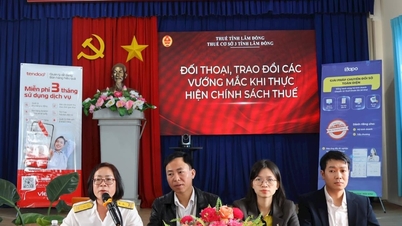
Deputy Prime Minister Ho Quoc Dung works with the Ministry of Justice on the situation of building and perfecting institutions and laws and key tasks in the coming time - Photo: VGP/Gia Huy
On the afternoon of November 11, Deputy Prime Minister Ho Quoc Dung chaired a meeting with the Ministry of Justice on the situation of building and perfecting institutions and laws and key tasks in the coming time.
Innovating the way of thinking in law-making, shifting strongly from "management" to "development creation"
Speaking at the meeting, Minister of Justice Nguyen Hai Ninh said, "never before has the judicial sector had to undertake such a large, heavy and complicated workload as it does today."
According to the Minister, this comes from many comprehensive reasons. First of all, the country is implementing a "revolution in institutional improvement" in the spirit of Resolution No. 27-NQ/TW of the Politburo on continuing to build and perfect the Socialist Republic of Vietnam's rule-of-law State in the new period. This Resolution sets out many new guiding viewpoints, including the requirement to innovate the thinking of law-making, shifting from a management-oriented approach to a harmonious combination of state management and development creation.
This requirement alone has had a profound impact on the entire work of building and perfecting laws, causing the volume of documents that need to be revised, supplemented and newly issued to increase sharply.
Minister Nguyen Hai Ninh also emphasized that along with the process of streamlining the organizational apparatus, from the central to local levels, the legal system must be comprehensively reviewed and adjusted to meet the new governance model.

Minister of Justice Nguyen Hai Ninh reports at the meeting - Photo: VGP/Gia Huy
The arrangement of reducing the number of focal points from 22 ministries to 14 ministries, 3 ministerial-level agencies; or the reorganization of local government from 3 levels to 2 levels, all require fundamental changes in social relations from the public sector to the private sector, from the central to the grassroots level, resulting in a huge volume of legal documents that need to be updated.
The law-making method has also undergone many important changes. Instead of the National Assembly agencies presiding as before, the Government is now responsible for presiding, ministries and branches are responsible for the draft law, and the Ministry of Justice takes on the role of reviewing legal techniques before submitting it for signature. This is a new and very heavy task, but the Ministry of Justice identifies it as a political responsibility and is ready to undertake it to ensure the overall institutional quality of the country.
The Minister affirmed that in the coming time, the Ministry of Justice will continue to promote the spirit of innovation, responsibility and creativity, and perform well the role of the Government's "gatekeeper" in terms of institutions, contributing to perfecting the legal system, serving the goal of rapid and sustainable development of the country.
Focus on innovating law-making work and improving the effectiveness of institutional improvement.
Reporting at the meeting, Deputy Minister of Justice Nguyen Thanh Tinh said that in 2025 in particular and the entire 2021-2025 term in general, the Ministry has focused on leading, directing and managing judicial work in a unified and synchronous manner; the direction and operation work is increasingly drastic, urgent, with many innovations in accordance with the annual operating motto of the Government and the Prime Minister.
To make the law-making work more effective, the Ministry of Justice has closely coordinated with the Government Office in urging, monitoring, and guiding ministries and branches to effectively implement the Law-making Program; at the same time, advising the Government and the Prime Minister to spend a lot of time directing, discussing, and giving opinions on draft legal documents at regular meetings and specialized meetings on law-making.
The Ministry is urgently researching and developing the Project "Perfecting the structure of Vietnam's legal system to meet the country's development requirements in the new era", considering this a strategic task, creating a foundation for the next stage of development.
Deputy Minister Nguyen Thanh Tinh stated that, along with implementing the tasks identified in the 2025 Work Program, the Ministry of Justice focuses on a number of key tasks such as: Effectively performing the tasks of the Standing Agency of the Central Steering Committee on perfecting institutions and laws, in which the focus is on advising, organizing the quality, effective and timely implementation of the task of reviewing legal documents to promptly detect and remove "bottlenecks".
The Ministry will effectively implement the Project "Application of digital technology in receiving and processing information and reflecting on difficulties in the system of legal documents", continue to upgrade and effectively operate the Information System for receiving and processing feedback and recommendations on legal documents and the National Law Portal; at the same time, complete the Project "Improving the structure of Vietnam's legal system to meet the requirements of national development in the new era".
The Ministry of Justice will closely coordinate with ministries, branches and localities to develop specific plans and solutions to handle 730/787 complaints and recommendations in 2025, ensuring timeliness, efficiency and compliance with regulations.

Deputy Prime Minister sets out 5 key requirements for the Ministry of Justice - Photo: VGP/Gia Huy
The Ministry of Justice must be exemplary and pioneer in law-making work.
Concluding the working session, Deputy Prime Minister Ho Quoc Dung acknowledged that the Ministry of Justice has recently promoted its role as an advisor, coordinator and "institutional gatekeeper" of the Government. The Ministry has proactively and actively advised the Government and the Prime Minister on the orientation of the legislative program for the entire term and each year; chaired or participated in drafting many high-quality draft laws and resolutions; and at the same time significantly improved the appraisal and control of legal documents.
In particular, the Ministry of Justice is one of the pioneering ministries and sectors in digital transformation, with many outstanding results such as the launch of the National Legal Portal, the Information System for receiving and processing feedback and recommendations on law, and the gradual completion of the database on the judicial sector. These results not only serve the people and businesses but also contribute to improving the effectiveness and efficiency of state management.
However, the Deputy Prime Minister also pointed out that there are still some shortcomings that need to be overcome, especially the slow progress in issuing documents guiding the implementation of laws and resolutions of the National Assembly in a number of ministries and branches; the handling of institutional "bottlenecks" is not really synchronous and timely; the quality of the legal team at the local level is not uniform.
The Deputy Prime Minister outlined five key requirements for the Ministry of Justice. First, the Ministry of Justice must be exemplary and pioneer in law-making, strictly comply with the Law on Promulgation of Legal Documents and the Government's Working Regulations; ensure the progress, quality and feasibility of assigned draft laws, ordinances and decrees.
"If the Ministry of Justice does well and takes the lead, it will have the basis to request other ministries and branches to seriously implement it," the Deputy Prime Minister emphasized.
Second, strengthen the guidance, inspection and urging of ministries, branches and localities in the development and promulgation of documents guiding the implementation of the law; promptly detect and propose solutions to shortcomings, ensure the consistency, synchronization and feasibility of the legal system, and avoid the situation of "Laws waiting for decrees, decrees waiting for circulars".
Third, step up the review and handling of institutional problems, especially legal issues that have been compiled by the Central Steering Committee on Institutional and Legal Improvement. The Ministry needs to proactively coordinate closely with relevant ministries and branches to promptly and thoroughly remove bottlenecks, and not let unreasonable regulations hinder the development of production, business and investment.
Fourth, improve the quality of appraisal, policy impact assessment and law enforcement monitoring. The promulgated regulations must be practical, clearly responsible, easy to understand and easy to implement. The Ministry of Justice needs to regularly assess the effectiveness of law enforcement, especially in areas related to administrative reform, decentralization and delegation of power, in order to detect problems early for timely adjustment.
Fifth, continue to promote the pioneering role in digital transformation of the judicial sector, stably and effectively operate the National Law Portal and legal data systems; enhance the application of information technology in receiving and handling feedback and recommendations from people and businesses.
Deputy Prime Minister Ho Quoc Dung requested the collective leadership of the Ministry of Justice to enhance their sense of responsibility, innovate their thinking, work resolutely, proactively, dare to think, dare to do, dare to take responsibility, and contribute to the full and timely institutionalization of the Party's policies and the directions of the Government and the Prime Minister.
Gia Huy
Source: https://baochinhphu.vn/bo-tu-phap-phai-guong-mau-quyet-liet-tien-phong-trong-hoan-thien-the-che-102251111192050256.htm



![[Photo] Prime Minister Pham Minh Chinh receives Lao Minister of Labor and Welfare Phosay Sayasone](https://vphoto.vietnam.vn/thumb/1200x675/vietnam/resource/IMAGE/2025/11/11/1762872028311_dsc-2246-jpg.webp)
![[Photo] Chu Noodles - the essence of rice and sunshine](https://vphoto.vietnam.vn/thumb/1200x675/vietnam/resource/IMAGE/2025/11/11/1762846220477_ndo_tl_7-jpg.webp)






























































































![Dong Nai OCOP transition: [Article 3] Linking tourism with OCOP product consumption](https://vphoto.vietnam.vn/thumb/402x226/vietnam/resource/IMAGE/2025/11/10/1762739199309_1324-2740-7_n-162543_981.jpeg)








Comment (0)